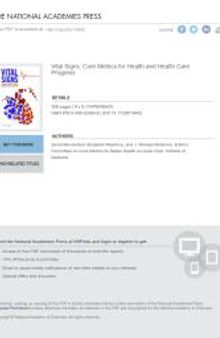 جزییات کتاب
جزییات کتاب
Thousands of measures are in use today to assess health and health care in the United States. Although many of these measures provide useful information, their usefulness in either gauging or guiding performance improvement in health and health care is seriously limited by their sheer number, as well as their lack of consistency, compatibility, reliability, focus, and organization. To achieve better health at lower cost, all stakeholders - including health professionals, payers, policy makers, and members of the public - must be alert to what matters most. What are the core measures that will yield the clearest understanding and focus on better health and well-being for Americans? Vital Signs explores the most important issues - healthier people, better quality care, affordable care, and engaged individuals and communities - and specifies a streamlined set of 15 core measures. These measures, if standardized and applied at national, state, local, and institutional levels across the country, will transform the effectiveness, efficiency, and burden of health measurement and help accelerate focus and progress on our highest health priorities. Vital Signs also describes the leadership and activities necessary to refine, apply, maintain, and revise the measures over time, as well as how they can improve the focus and utility of measures outside the core set. If health care is to become more effective and more efficient, sharper attention is required on the elements most important to health and health care. Vital Signs lays the groundwork for the adoption of core measures that, if systematically applied, will yield better health at a lower cost for all Americans.
 درباره نویسنده
درباره نویسنده
مؤسسه پزشکی هاورد هیوز (به انگلیسی: Howard Hughes Medical Institute) معروف به HHMI، تأسیس ۱۹۵۳ در مریلند، یک مؤسسه علمی غیرانتفاعی آمریکاییست.



 دانلود کتاب
دانلود کتاب

 جزییات کتاب
جزییات کتاب
 درباره نویسنده
درباره نویسنده





 این کتاب رو مطالعه کردید؟ نظر شما چیست؟
این کتاب رو مطالعه کردید؟ نظر شما چیست؟
